Leaving No Republican Behind
In a state that likes the GOP, Ohio Gov. Ted Strickland, a Democrat, is succeeding by respecting those who disagree with him. Members of his party who are seeking the presidency should take note.My interview with Ohio Gov. Ted Strickland was delayed for a reason that explains why this Democrat is so popular in a state that was once considered a Republican bastion.
In the course of his travels Saturday, Strickland discovered that a farm in a heavily Republican area near Cincinnati was celebrating its 200th anniversary as a family-run operation. The governor decided he had to drop by and chat with some folks who probably didn’t vote for him. Strickland is one Democrat who tries to leave no Republicans behind.
At a moment of festering polarization in national politics, Strickland is Mr. Consensus. He doesn’t hide his progressive views — he calls himself “pro-choice, pro-labor and pro-universal healthcare” — and yet just about everyone thinks of this ordained Methodist minister as a moderate because he spends a lot of time in places where Democrats don’t dare venture, offering soothing sentiments you’re unlikely to run into on talk radio or the Internet.
“If you act with respect toward the people who disagree with you,” Strickland said over the telephone when we finally got around to talking, “they’ll give you a break and won’t cut you off.”
Strickland’s political skill only partly explains Ohio’s political transformation. A state that voted narrowly for President Bush in 2000 and 2004 not only elected Strickland as governor in 2006 but also sent Sherrod Brown, an economic populist with a far more liberal public profile, to the United States Senate.
The conversion rate among Ohio voters in just two years was staggering. According to exit polling, 30 percent of Ohioans who voted for Bush in 2004 voted for Strickland in 2006; 20 percent of Bush’s 2004 voters supported Brown.
Why the big change? Scandals involving former Gov. Robert Taft and former Rep. Bob Ney made even loyal Republicans squeamish. Strickland won a fifth of self-identified Republicans and a quarter of conservatives, while holding on to more than 90 percent of liberals and Democrats, and roughly 70 percent of moderates and independents. If national Democrats reached such numbers in 2008, they’d win the presidency decisively.
The new economy has hit Ohio hard. Industrial cities such as Youngstown and Cleveland have suffered under the lash of globalization. Brown’s tough stand against free trade appealed in a place where the loss of well-paying blue-collar jobs makes the promise of a flat world fall very flat indeed.
What might Democratic presidential candidates learn from Ohio? As a matter of style, Strickland suggests they understand that “people are desperately wanting to believe that political leaders understand them and that they are trying to deal with their day-to-day lives.” Memo to overly cautious candidates: Strickland also thinks that “the display of genuine emotion is important.”
Substantively, Strickland says the economy matters most, although he has been a strong opponent of the Iraq war from the beginning. “The foreclosure problem is huge,” Strickland says. “The people are desperate for jobs.” He sees healthcare and education as central — they were the key issues in his recent budget. These questions “ought to give Democrats a leg up,” but only if they can “talk about these things in a way that gets people to believe you will do something about them.”
There’s the rub for Democrats in 2008. Voters want government to work but aren’t sure that it can. They want government to solve problems but worry that it won’t. This creates a strategic paradox: Democrats need to discredit Bush’s government without discrediting government altogether.
Strickland, because he has executive power, has advantages most Democratic presidential candidates don’t. In introducing his first budget, he decided not to increase taxes. Confronting a Legislature under Republican control, he chose to deprive the GOP of what would have been its main talking point against him. “I think some of my Republican colleagues were unhappy about that,” Strickland said with a chuckle about his no-tax-increase budget. But he did push successfully for a broad children’s health insurance plan and a freeze on tuitions at state colleges and universities, both of which make voters happy.
State Rep. Kevin DeWine, the deputy chairman of the Ohio Republican Party, credits Strickland with introducing “a budget that was pretty fiscally responsible,” but argues that Strickland has not been tested yet. “He’s not had to make a decision where he’s had to expend any political capital,” DeWine said.
That’s true. On the other hand, Strickland has capital to spend because he has combined progressive goals with a moderate demeanor and a cheerful approach to potential adversaries. When you talk to him, you realize you’re not in Washington anymore.
E.J. Dionne’s e-mail address is postchat(at symbol)aol.com.
(c) 2007, Washington Post Writers Group
Your support matters…Independent journalism is under threat and overshadowed by heavily funded mainstream media.
You can help level the playing field. Become a member.
Your tax-deductible contribution keeps us digging beneath the headlines to give you thought-provoking, investigative reporting and analysis that unearths what's really happening- without compromise.
Give today to support our courageous, independent journalists.
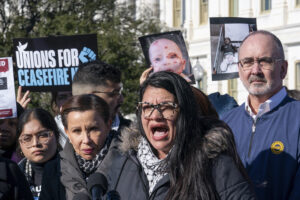
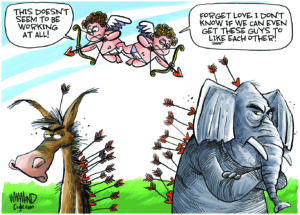
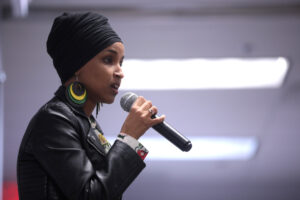
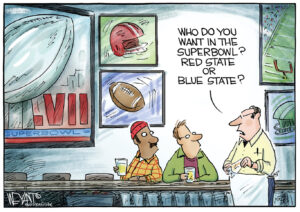
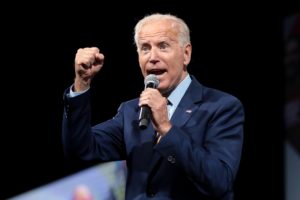

You need to be a supporter to comment.
There are currently no responses to this article.
Be the first to respond.